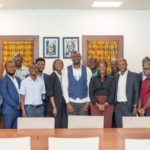
The Ghana Interbank Payment and Settlement Systems Ltd (GhIPSS) recently hosted a delegation from the Bank of Sierra Leone on a two–day study tour aimed at exploring how Ghana has implemented its financial payment systems.
The team visited GhIPSS to learn about the innovations which have transformed electronic payments in the country.
As part of the study tour, GhIPSS exchanged knowledge on Ghana’s Interoperability Journey, the Operations of the Instant Payment System, the Governance and Ownership of Instant Payment Platforms, and the collaborative efforts with partner banks on the implementation and usage of our services. During the two days, the discussions focused on insights and how Ghana’s payment system is driving financial inclusion and the key factors driving its success.
Sierra Leone’s payment industry has undergone a remarkable evolution since gaining independence. It has not only broadened its services to a larger number of their population but has also spearheaded innovation within their country.
Operating under the license and supervision of the Bank of Sierra Leone, serving as the central bank and national banking regulator, the bank’s journey serves as a significant case study for postal transformation.
The exchange of knowledge between Ghana and Sierra Leone in payment systems development holds numerous benefits for both countries. Enhanced payment systems boost financial inclusion, economic growth, and digital innovation.
By adopting best practices from Ghana, Sierra Leone can further improve the reach and efficiency of its payment platforms, ensuring that more people can access secure, convenient, and affordable financial services.
In a statement, Clara B. Arthur, CEO at GhIPSS, highlighted the mutual benefits of the engagements: “It is good that we exchange knowledge and engage in meaningful discussions about advancing payment systems across our countries. The engagement between Ghana and Sierra Leone offers a unique opportunity to explore how we can build more robust, diversified, and interoperable payment ecosystems to serve the evolving needs of our populations.” She said.
The shared knowledge and insights will undoubtedly influence future policies and innovations, helping both nations to remain at the forefront of the ongoing digital transformation of Africa’s financial sector.



